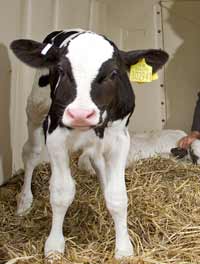Don’t skimp on milk replacers warns NWF expert

Down grading milk replacer is a false economy and can jeopardise calf growth and health, according to James Slater, NWF Agriculture calf specialist.
“Switching to a low grade replacer may reduce feed costs by about £10/calf, but this apparent saving will soon disappear when increased intervention is required to treat scouring and poor performing animals.
“When lower feed costs result in increased health treatments and reduced growth, it is clearly a false economy,” he says.
With the pre-weaning period being the most crucial phase in the animal’s total life, young calves need to achieve high intakes to help them grow quickly, develop a healthy immune system and develop the rumen.
“Any checks in early life will affect age at calving and the animal’s lifetime profitability.”
“The key to high intakes is a palatable, pleasant smelling and well-flavoured product which mixes well and has a composition closely resembling cow’s milk.”
The energy in milk replacers is primarily in the form of oils which do not mix readily with water. Therefore, emulsifiers are needed to achieve an effective and stable mix.
“However, many cheap powders contain insufficient emulsifiers to achieve a consistent stable mix, resulting in a less palatable feed,” Mr Slater warns.
The source of natural oils is also an important consideration. “Calves need a good supply of unsaturated fatty acids, yet cheap powders are often based on unsuitable, saturated fats like palm oil and coconut oil.”
Cheap powders also tend to rely on oils being sprayed onto the powder surface resulting in large areas of fat which are difficult for the calf to digest. “The consequence of reducing fat and oil quality is slower growth and increased digestive upset,” he says.
Cheaper protein sources also cause similar problems. “Where vegetable protein sources are used, there is a risk of reduced protein digestibility leading to severe gut disorders.”
“High quality milk replacers based on whey powder and skimmed milk will give calves the best start and reduce the risk of scours and other problems,” Mr Slater says.
